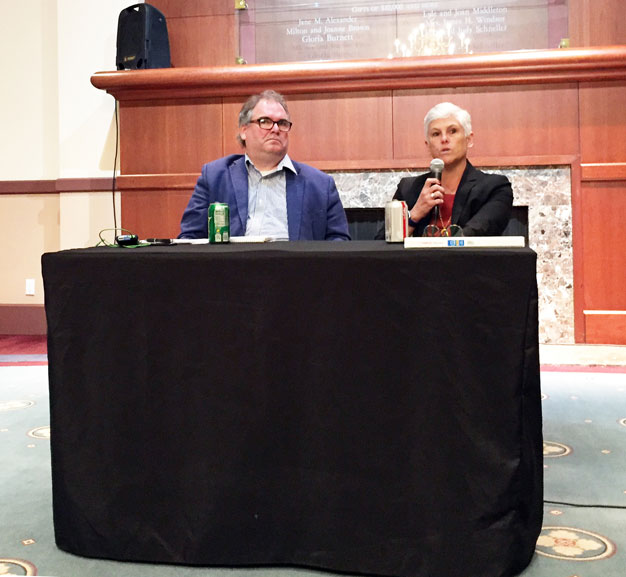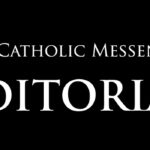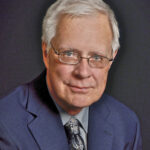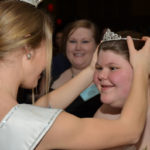By Barb Arland-Fye
The Catholic Messenger
DES MOINES — Deborah Rosenblum of the Nuclear Threat Initiative set the scene for her Nov. 21 talk at Drake University with an imagined scenario of nuclear confrontation between Russia and NATO in 2020.
“The outcome: hundreds of thousands of dead and injured people, global economies collapsing, food and medicine are scarce, civil liberties vanish. In other words, the end,” she told an audience of around 30 people.

Moderator Douglas Burns listens as Deborah Rosenblum responds to a question during a conversation on nuclear dangers at Drake University in Des Moines on Nov. 21.
Her talk came just three days before Pope Francis made a statement in Nagasaki, Japan, calling for nuclear disarmament. Nearly 75 years ago, tens of thousands of people died after the U.S. dropped atomic bombs on the Japanese cities of Hiroshima and Nagasaki — the first and only use of nuclear weapons in war.
With escalating tensions around the world today, the Nuclear Threat Initiative, which Rosenblum serves as executive vice president, aims to raise awareness about the threat of nuclear war and to reduce that threat. Iowa, which hosts the first-in-the-nation presidential caucus, is fertile ground for the awareness campaign. Reducing the risk of nuclear war needs to move to the front burner, Rosenblum, a former Department of Defense staffer, said.
The catastrophic scenario she described could happen today. “We have all the ingredients; tensions currently with Russia, a breakdown of the arms control agreement, vulnerability to cyber and other advanced technology —even towards nuclear weapons systems,” she said.
“Our nation is at risk of nuclear war by accident or a terrible miscalculation. We are living in a time with capacity for and the likelihood of the use of weapons of mass destruction growing. I’m here to ask, ‘Are you OK with this?’” Her audience responded, “No!”
Among the risks the world faces, the U.S. and Russia possess 90 percent of the world’s 14,000 nuclear warheads, Rosenblum said. Relations between the two countries are near total collapse. Unless extended, the New START Treaty between the United States and Russia will expire in February 2021 just two weeks after the next presidential inauguration. The current administration withdrew from the Intermediate-Range Nuclear Forces Treaty earlier this year. Russia withdrew from the treaty after the United States’ withdrawal.
Abandoning nuclear weapons treaties creates instability and increases the risk that nuclear weapons could spread. Arms control treaties are “essential guard rails and constraints around weapons of mass destruction,” which now are being torn down, Rosenblum said.
North Korean advances in nuclear weapons and missile delivery systems have reached a particularly dangerous point and negotiations to eliminate them have not gotten off the ground in a serious way, despite meetings between the two countries’ leaders, she said.
Another threat, terrorists seeking weapons of mass destruction appear to be gaining ground in opportunities, capacity and knowledge base. Cyber threats and other advance technology present still another critical challenge for government and industry across a host of sectors.
The way in which the U.S. and Russia configure their forces also creates vulnerabilities related to cyber threats, she said. Both countries’ nuclear weapons are in a ready-to-launch, hair-trigger mode, leaving no time for either president to make a considered decision. “Like climate change, nuclear weapons hold an existential threat to our planet.”
She asked her audience to help build awareness and advocate for action on measures to reduce the risk of nuclear war. “It is absolutely possible to make a change and to make progress together to build a safer world, but officials need to hear from you, that this is a priority.”
As presidential candidates continue to cross the state in anticipation of Iowa Caucus 2020 on Feb. 3, Rosenblum encouraged her audience at Drake University to ask elected officials and presidential candidates how they will address nuclear security. Specifically:
• What is the need for thousands of weapons whose primary purpose is to never be used? The U.S. could ensure national security with 900 warheads, not 6,000-plus, according to Gen. James Cartwright, who oversaw U.S. nuclear weapons under President George W. Bush and served on President Obama’s Joint Chiefs of Staff. Elected officials and the military should collaborate to determine the right number of weapons needed to protect national security, and then engage Russia on new treaties.
• What is your position on extending the New START Treaty, which is set to expire in February 2021, unless the president decides to extend it? Negotiated in 1991 as START (Strategic Arms Reduction Treaty), and renegotiated and implemented in 2010 as the New START Treaty, it limits the number of warheads and delivery vehicles (missiles and bombers) that each country can deploy. The treaty also reduces deployed strategic warheads and includes verification requirements (USCCB, Office of International Peace and Justice, February 2018). The president could extend the treaty for another five years.
• Should the U.S. keep nuclear weapons on hair-trigger posture?
• How will you encourage talks between the U.S. and Russia to reduce nuclear risks now?
Rosenblum also encourages Iowans to write a letter to the editor of their local newspapers about this important issue.
During a question and answer session afterwards, Des Moines psychiatrist Dr. David Drake of Physicians for Social Responsibility (PRS) expressed his concern about the phrase “ensure national security with 900 warheads, not 6,000+.” In his opinion, “we must include the ultimate goal of the complete abolishing of nuclear weapons – we are neither safe nor secure with 900 warheads.” The Nuclear Threat Initiative takes the approach of advocating for step-by-step reduction of nuclear warheads as a way toward nuclear disarmament, Rosenblum said.
She also addressed a question from The Catholic Messenger about the pope’s visit to Japan. “This is something we should all welcome,” she said, referring to the Holy Father visiting the “only places where nuclear weapons have been used” and hearing from some of the few remaining survivors.
Pope Francis “has been very outspoken on the need to move far more quickly on nuclear disarmament,” she said, noting that he made an impassioned speech in 2017 in Rome on the humanitarian consequences of nuclear weapons. The pope’s visits to Hiroshima and Nagasaki “help to humanize the issue.”
Rosenblum believes the Catholic Church has evolved in its thinking on nuclear deterrence. “We’ve been working with other faith communities, including the Catholic Church, she said. “We need to have leaders throughout society speaking on these issues and galvanizing action.”











